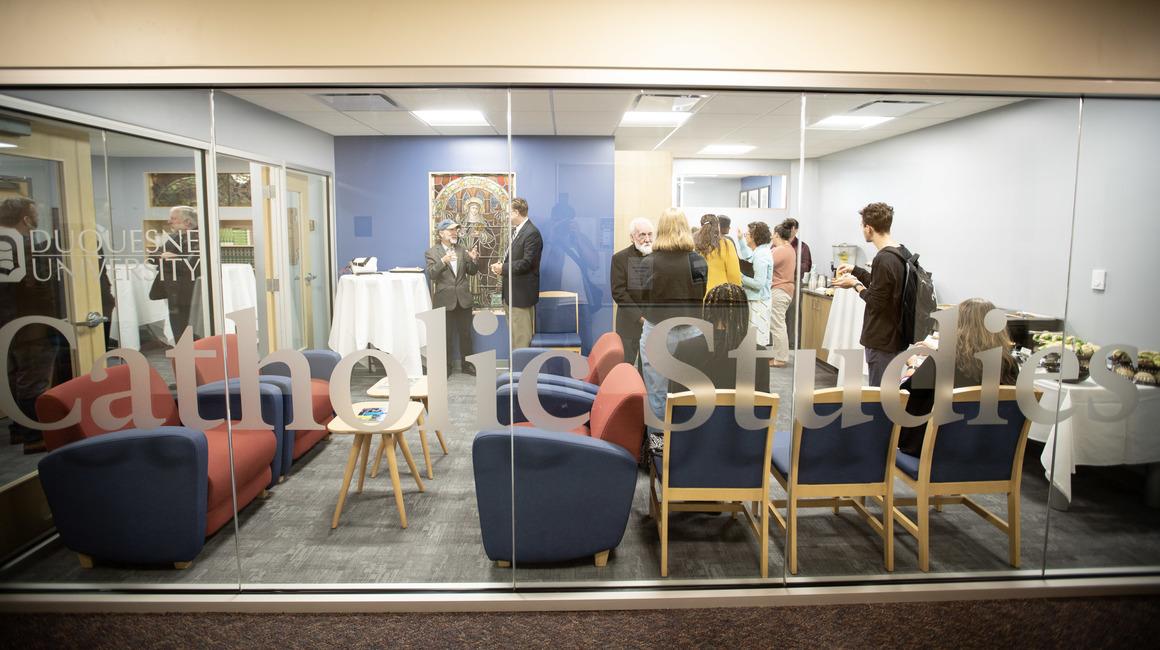In July 2025, the Vatican announced that Pope Leo XIV will confer upon St. John Henry Newman the title of Doctor of the Universal Church. Faculty in Duquesne University’s Department of Catholic Studies were instrumental in helping make the case for Newman to receive this distinction, which has been bestowed only in exceptionally rare cases.
A Doctor of the Universal Church is a title conferred by the Pope, recognizing an individual who has attained sainthood and who has produced a sufficient body of theological contributions of enormous influence on the Church.
Only 38 saints have ever received this title in the 2,000-year history of the Catholic Church. The process requires significant evidence that the person’s work has been both influential and beneficial to the Church on a wide scale.
St. John Henry Newman was a nineteenth-century Anglican priest who converted to Catholicism before ascending to the rank of cardinal. At the time of his conversion, he was already a respected religious intellectual in England and at Oxford. While his decision to convert cost him relationships and family, his influence on the Church was significant, with his writings and ideas about doctrinal development being crucial to the Second Vatican Council.
Kenneth Parker, Ryan Endowed Chair for Newman Studies at Duquesne University; Christopher Cimorelli, director of the National Institute for Newman Studies and associate editor of the Newman Studies Journal; and Elizabeth Huddleston, associate editor of Newman Studies Journal and Teaching Fellow in Duquesne’s Department of Catholic Studies, collaborated for months, along with 17 other scholars they recruited. Together, they helped create the Positio, or the formal collection of documents used to make the case for the title.
“As a historical theologian,” Parker said, “it has been a rare privilege to assist in the creation of a historic document in the life of the Church. The National Institute for Newman Studies here in Pittsburgh was critical in bringing together the scholars we needed to complete the Positio.”
Because a Positio is an exhaustive review and assembly of historical and canonical documents, it typically takes three to five years to assemble. With a special interest in Newman earning the recognition during the Church’s 2025 Jubilee Year, Parker and his team had an accelerated timeline, compiling the Positio in roughly six months.
Working through the National Institute for Newman Studies (NINS), formally affiliated with Duquesne since 2010, Parker, Cimorelli and Huddleston helped coordinate an international network of scholars and contributed to a key chapter on St. John Henry Newman’s theological influence and eminence of teaching.
“It was a blessing and scholarly privilege to support St. John Henry Newman’s cause, and what a joy to see the success of the affiliation between NINS and Duquesne and how it benefits the Church,” Cimorelli said.
Huddleston added, “It was a joy and pleasure to work with a team of world-renowned scholars for such a momentous cause.”
Duquesne’s faculty also supported the Vatican’s evaluation by ensuring access to the National Institute for Newman Studies’ comprehensive resources: A world-class print library, the digital Newman Reader and the NINS Digital Collections.
Duquesne’s and NINS’ role in this milestone underscores the global reach of its faculty and the lasting impact of Catholic scholarship rooted in access, preservation and intellectual tradition.
“It’s well known that Duquesne faculty contribute to scholarship and community engagement across a variety of fields,” said Duquesne University President Ken Gormley. “It is especially heartening to see our faculty participating so crucially in the intellectual life of the Catholic Church, whose faith tradition animates our unique Spiritan mission at Duquesne.”
“The thoughtful and steady attention that these scholars and many others have given to Newman through the Institute over the last two decades has made a huge contribution to Catholic thought,” said Catharine M. Ryan, co-founder of the National Institute for Newman Studies and emerita member of the Duquesne University Board of Directors. “We always knew of the spiritual and intellectual significance of Newman’s work, but to have it recognized in a way that elevates him to such status is truly wonderful, and a sign of the importance of such study.”
Duquesne is the only Catholic and Spiritan university in the United States. It was founded and remains sponsored by the Spiritan Congregation, which promotes openness to the Spirit, developing authentic relationships and serving those on the margins of society.
Fr. John Fogarty, the U.S. Provincial of the Congregation of the Holy Spirit, stated: “St. John Henry Newman himself sought with great care what it meant to have an authentic faith and how the Church’s doctrine of faith worked over time. While he was not himself a Spiritan, his work resonates very much with what our congregation does.”
The National Institute for Newman Studies has additional information about Newman and the Doctor of the Church designation on its website.
Duquesne University
Founded in 1878, Duquesne is consistently ranked among the nation's top Catholic universities
for its award-winning faculty and horizon-expanding education. A campus of more than
8,200 graduate and undergraduate students, Duquesne prepares students by having them
work alongside faculty to discover and reach their goals. The University's academic
programs, community service and commitment to equity and opportunity in the Pittsburgh
region have earned national acclaim.
It's time for bigger goals. Follow Duquesne University on Facebook, X (formerly Twitter), Instagram and LinkedIn.
www.duq.edu
News Information
Topics
Published
September 08, 2025


